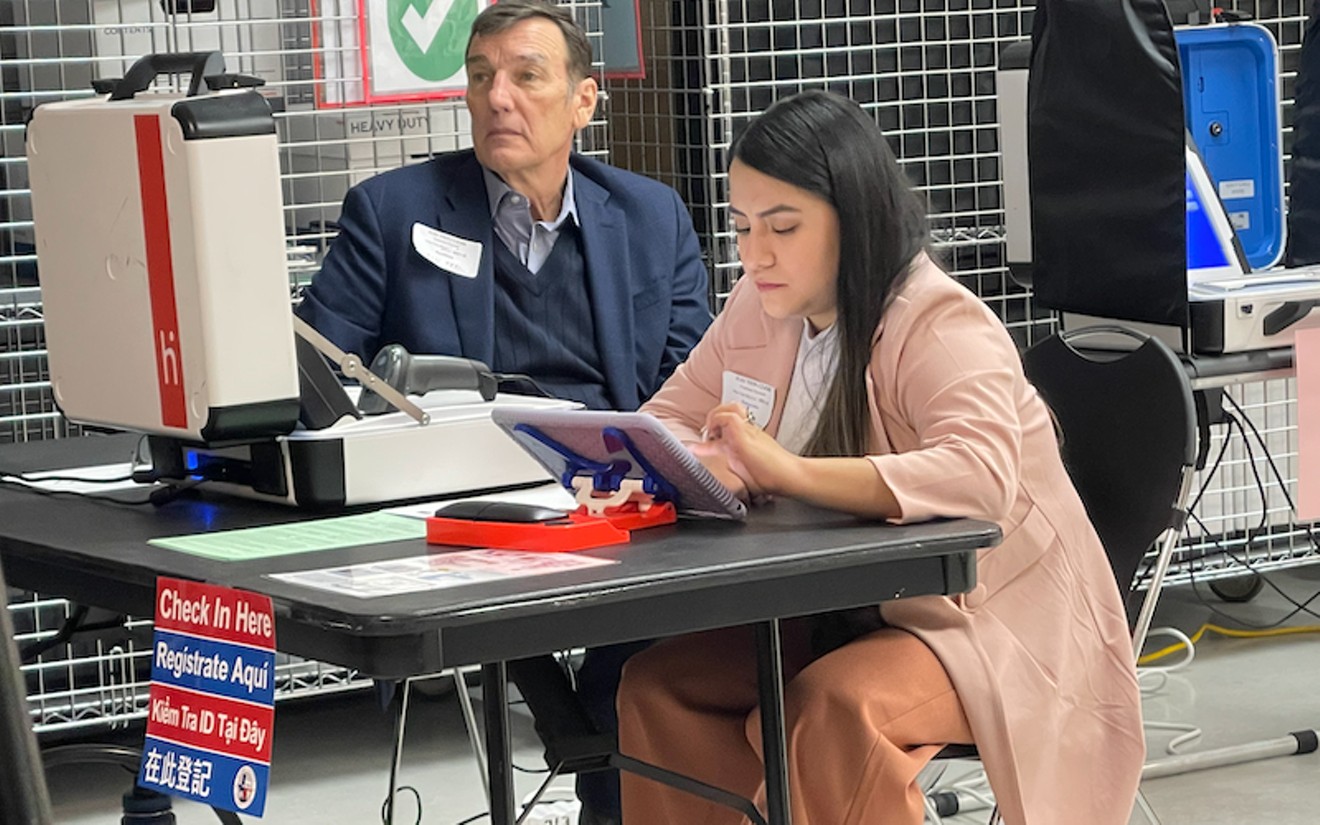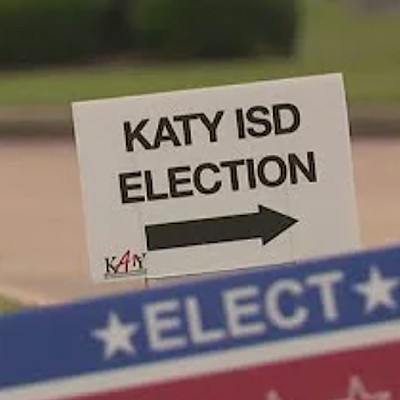On Tuesday, Houston area early voters will have the opportunity to cast their ballots in several local and statewide contests and help choose which candidates will appear on the ballot for the 2024 U.S. presidential race.
Harris County Clerk Teneshia Hudspeth said voters will have to decide what primary they are participating in — Democratic or Republican — when arriving at any of Harris County’s 79 early voting polling locations. What party a voter chooses and where they live will determine which races appear on their ballot.
During a Monday morning press conference, Hudspeth said voters can expect to see between 56 to 65 contests on their ballots. She added that leading up to Monday, sites were being set up and workers were preparing to receive voters.
According to Rice University political science professor Mark Jones, the top races to watch locally in the Democratic primary include contests for Harris County District Attorney, U.S. House District 18 and Senate District 15 — previously held by Houston Mayor John Whitmire.
U.S. Rep. Sheila Jackson Lee has represented Texas’s 18th congressional district for nearly 30 years. This is the first time Jackson Lee will face a significant challenger in former At-Large Houston City Council member Amanda Edwards.
Edwards was elected to Houston's city council in 2015 and served until 2020. During her time on council, she led former Houston Mayor Sylvester Turner’s technology and innovation task force and focused her work on public transit matters.
In 2020, she unsuccessfully ran to be the Democratic nominee against U.S. Senator John Cornyn. Last year, Edwards joined the Houston mayoral race before dropping out when Jackson Lee entered the contest. The municipal finance attorney subsequently announced her candidacy for the congresswoman’s seat.
Edwards said she entered the congressional contest to bring new ideas and a younger, fresh perspective. Jones added that the two candidates are likely to be similar in the policies they endorse. Voters will instead have to decide whether they want to choose between experience or change.
“I think you’re making a choice and looking towards the future,” Jones said. “And in terms of supporting Edwards, it's effectively saying, ‘Okay, we’re going to give up a little bit of influence and seniority in the short term, but in the long term, we’re going to have somebody who’s more dynamic and represents the younger generation.'”
Edwards has pointed out that Jackson Lee authored fewer than 10 bills that passed into law in the last 30 years the congresswoman has served. She added that she intended to focus on transitioning the seat to be more policy-driven. Edwards has referenced healthcare access, economic opportunity and immigration reform as top priorities.
During her time in Congress, Jackson Lee helped secure disaster relief for Houston area residents after Hurricane Harvey in 2017. The congresswoman also authored the bill establishing Juneteenth as a national holiday and the Violence Against Women’s Act. She serves on three congressional committees, including the House Committees on Judiciary, Homeland Security and the Budget Committee.
Jones said the race will likely hinge heavily on turnout. If younger voters — who tend to favor Edwards more than the congresswoman — and non-core Jackson Lee supporters flock to the polls, it will be better for the former city council member. However, if it’s lower voter turnout, and older Black voters dominate it, Jackson Lee may be successful in her reelection bid.
A third candidate, business owner Robert Slater, also filed to run in the race in December. However, he has not raised or spent any campaign funds for the upcoming election.
Jones anticipates a relatively low turnout, less than the 2020 primaries in the last presidential year. A total of 195,723 Republican voters cast their ballots in the 2020 Republican primary, and 328,496 Democrats cast their ballots in the Democratic primary. He added that the Senate race is looking increasingly noncompetitive between leading candidates State Representative Roland Gutierrez (D-San Antonio) and U.S. Rep. Colin Allred in their challenge to go up against Republican incumbent U.S. Senator Ted Cruz.
“So, while that (this race) will drive some people out, it won’t drive out the same proportion of people if Gutierrez was mounting a much more significant threat to Allred,” he said.
Jones said a closely followed race locally is the Harris County District Attorney's race between incumbent Kim Ogg and challenger Sean Teare. Teare previously worked for Ogg’s office as a prosecutor and led the office's vehicular crimes division before deciding to run against his former boss.
Teare said he announced his candidacy because he wants to fix problems within the office regarding a lack of experienced prosecutors, accepting charges and the intake system. He added that he wanted to implement a risk-based model for bail reform.
Ogg’s approach to the position has raised the eyebrows of a significant share of Democratic primary voters. Some Democrats believe she is a Democrat in name only, as her actions since taking office are more conservative than these voters anticipated.
Those on the left criticize her views on bail reform, and, more recently, Ogg faced backlash for taking action on an investigation that led to several of Harris County Judge Lina Hidalgo’s former aides facing indictments regarding a COVID-19 vaccine outreach contract.
After her challenger received the county judge's endorsement, Ogg accused Teare of cutting a deal with Hidalgo. In response, Teare said if elected, he would recuse the county from the case and hand it over to a district attorney of a nearby county.
Jones said he does not think it is a matter of whether or not Teare will win but what his margin of victory will be, “Ogg is in a difficult position of having a record that the majority of supporters of John Whitmire would agree with, but that’s not who votes in the Democratic primary,” he said.
“The big question with Teare is what he is going to do in office,” he added. “Is he going to be a more moderate, less polemical DA, or is he going to be a progressive (George) Soros-style DA?”
Six Democratic candidates, including Texas representative Jarvis Johnson (D-Houston), emergency room nurse and community organizer Molly Cook, attorney-mediator Todd Litton, renewable energy developer and teacher Karthik Soora, lawyer Alberto “Beto” Cardenas Jr. and executive director of the Anderson Center for the Arts Michelle Anderson Bonton, will be vying to take over Whitmire’s seat in the Texas Senate.
Joseph L. Trahan, a real estate and energy businessman, is the sole Republican running to fill Whitmire’s chair, which is open for the first time in more than four decades. Regardless of whether or not this race goes into a run-off, Governor Greg Abbott has called for a special election on Saturday, May 4, to determine who will complete Whitmire’s term in office, which runs until January 2025.
Jones said those who are keeping an eye on whether Texas should adopt a voucher system — as Gov. Abbott wants — should pay close attention to which of the 16 Republican House incumbents facing primary challengers win.
Abbott-backed candidates are challenging these incumbents who were a part of the group of 21 Republicans voting against vouchers during one of last year's special sessions.
“The more of them lose, the more likely we are to see school choice legislation passed in 2025, which will have a direct impact on the Houston area,” Jones added.
This is the first time the county will be holding joint primaries, with both Democratic and Republican voters having the ability to cast their ballots at the same polling locations on the same machines.
On Monday, Hudspeth said Harris County Republican and Democratic party chairs decided to do joint polling with the Harris County Clerk's office. She added that the county was facing legislation that would have demanded the county add 100 more polling places than the number Harris County had in the 2022 and 2020 primaries, according to reports.
It would've also required the county to have additional equipment that was not possible to get enough on time for the upcoming election, she said.
Hudspeth said voters can choose to be assisted by poll workers from their own party or by either party. Democratic and Republican poll workers will have name tags to identify them as belonging to one party or the other. Voters will also be using a new one-page ballot due to a recent software upgrade, mitigating the chances of paper jams and other technical difficulties sometimes caused by using the older two-page ballot papers.
There will be election technicians at every voting site and in the field called "cluster techs" to address any issues. According to Hudspeth, all polling locations are fully staffed, and additional workers are available.
"You all should know things happen, people get sick, someone doesn't show up," she said. "So, we have a ready pool of individuals who are ready to step in and go to those polls in case something happens between tonight and tomorrow."
The Harris County Elections Technology Center, 11525 Todd, Suite 100 in Houston, will serve as the central count headquarters on Election Day and the election command center on Election Night. Like last November's election, Harris County will have six rallying sites — the technology center is not one — where presiding election judges will go to the site assigned to drop off their required items.
The final drop off of items will occur at the technology center, accompanied by law enforcement.
Early voting starts on Tuesday, February 20, and goes through Friday, March 1. Early vote centers will be open from 7 a.m. to 7 p.m., except for Sunday, February 25, when polling locations will be open from noon to 7 p.m.
On Tuesday, March 5, 545 vote centers will be open on Election Day from 7 a.m. to 7 p.m. The deadline to apply for a ballot by mail is Friday, February 23.
Support Us
Houston's independent source of
local news and culture
account
- Welcome,
Insider - Login
- My Account
- My Newsletters
- Contribute
- Contact Us
- Sign out
Early Voting For 2024 March Primary Elections Starts On Tuesday
Faith Bugenhagen February 19, 2024 2:27PM

Harris County residents opting to vote early in the 2024 March primary election will be able to choose from 79 early vote centers.
Photo by Faith Bugenhagen
[
{
"name": "Related Stories / Support Us Combo",
"component": "11591218",
"insertPoint": "4",
"requiredCountToDisplay": "4"
},{
"name": "Air - Billboard - Inline Content",
"component": "11591214",
"insertPoint": "2/3",
"requiredCountToDisplay": "7"
},{
"name": "R1 - Beta - Mobile Only",
"component": "12287027",
"insertPoint": "8",
"requiredCountToDisplay": "8"
},{
"name": "Air - MediumRectangle - Inline Content - Mobile Display Size 2",
"component": "11591215",
"insertPoint": "12",
"requiredCountToDisplay": "12"
},{
"name": "Air - MediumRectangle - Inline Content - Mobile Display Size 2",
"component": "11591215",
"insertPoint": "4th",
"startingPoint": "16",
"requiredCountToDisplay": "12"
}
]
KEEP THE HOUSTON PRESS FREE...
Since we started the Houston Press, it has been defined as the free, independent voice of Houston, and we'd like to keep it that way. With local media under siege, it's more important than ever for us to rally support behind funding our local journalism. You can help by participating in our "I Support" program, allowing us to keep offering readers access to our incisive coverage of local news, food and culture with no paywalls.
Trending News
- Column: Opting Out of the STAAR Test Requires a Law Degree Or Iron Will
- HISD Scrambles As it Admits Its EOY Assessment Data is Wrong [UPDATED]
- Former Katy ISD Trustees Band Together To Support Two Trustees Running For Re-Election
-
Sponsored Content From: [%sponsoredBy%]
[%title%]

Don't Miss Out
SIGN UP for the latest
news, free stuff and more!
Become a member to support the independent voice of Houston
and help keep the future of the Houston Press FREE
Use of this website constitutes acceptance of our
terms of use,
our cookies policy, and our
privacy policy
The Houston Press may earn a portion of sales from products & services purchased through links on our site from our
affiliate partners.
©2024
Houston Press, LP. All rights reserved.






